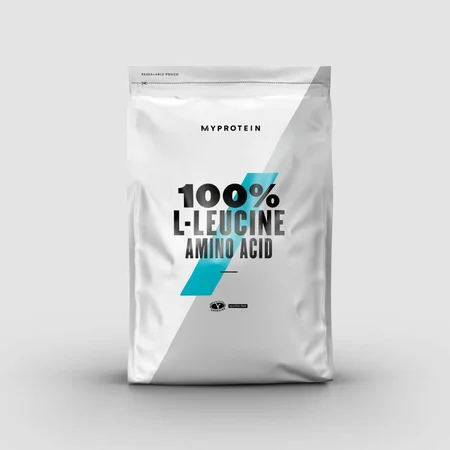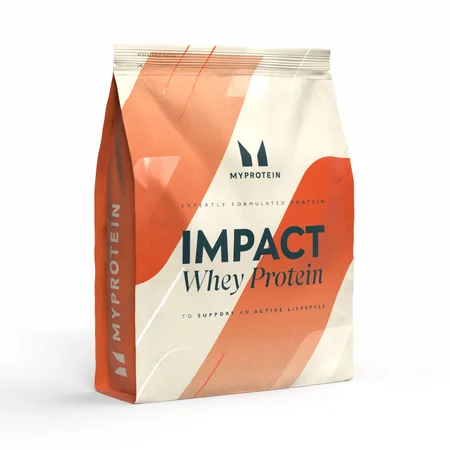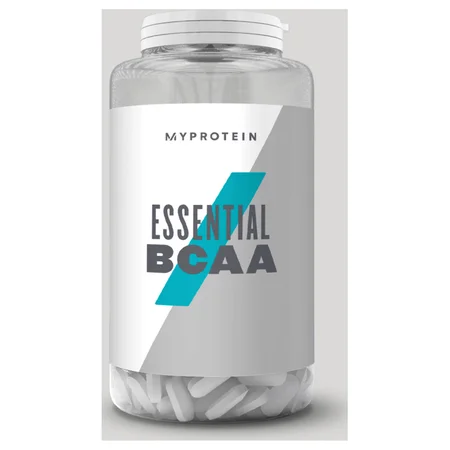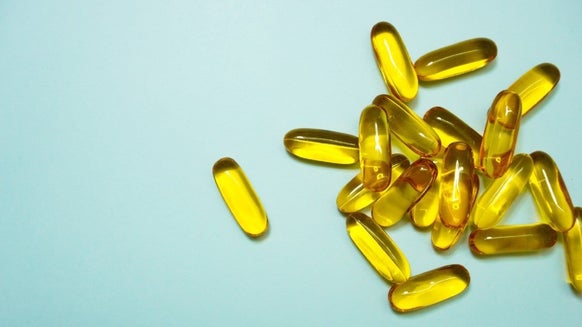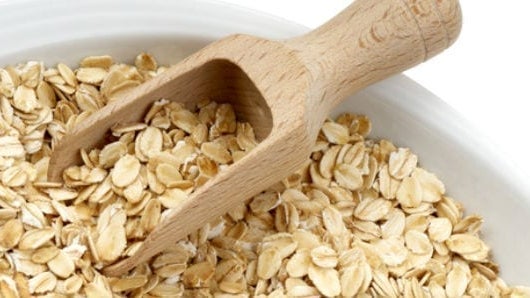3 Health Benefits Of Leucine

You know by now that dietary protein is important for muscle building, strength performance, recovery, and overall health, but are you getting enough leucine? Actually, firstly, do you know what leucine is and how it could be beneficial to you? We’ll tell you.
In this article, you’ll find:
What is leucine?
Leucine and body composition
Leucine and athletic performance
Leucine and immunity
Dietary sources of leucine

What is Leucine?
Leucine is one of the nine essential amino acids and one of the three branched chain amino acids, as such it can’t be produced in our body and must be obtained through dietary sources. Once ingested, leucine is primarily put to use in skeletal muscle — not surprisingly, this caught the attention of researchers, who have since investigated the potential performance-enhancing properties of leucine.1 Considering there are recommended dietary intakes of leucine (from 14 up to >45 mg per kg of body mass per day in highly active individuals) it must be important that we get enough of it. Let’s find out why…2
1. Beneficial for body composition
Muscle building
Leucine stimulates a signalling pathway that leads to the synthesis of new muscle proteins.3 Increasing muscle protein synthesis keeps you in a state of positive nitrogen balance — this is where you want to be if you’re trying to build muscle mass.
The performance enhancing (ergogenic) effects of leucine were investigated in a review that analysed almost one thousand participants. It was reported that leucine supplementation lead to greater gains of lean muscle mass and total body mass compared to those who weren’t taking leucine.4
In one particular study, participants who consumed 3g of leucine, twice daily, in conjunction with a 12-week resistance training programme experienced an average increase of 1.9kg of lean muscle mass.5 It was predominantly type II (fast-twitch) muscle fibres that reaped the benefit of leucine — type II fibres are mainly recruited for strength and explosive power exercise, such as sprinting.6
More so, the muscle building response following leucine supplementation alone was comparable to that of complete proteins, such as whey protein concentrate, whey protein hydrolysate, and soy protein concentrate.5 Another bonus – leucine packs fewer calories than whey protein, so it’s a good option if you’re controlling your energy intake.
Preventing muscle breakdown
Now, the majority of us don’t train 365 days a year. It’s natural (and necessary) to have periods away from training — whether attributed to injury, illness, or simply giving your body a rest. During these recovery periods, we want to avoid losing the muscle mass that took months of hard work to build. Luckily, leucine could help us out here.
You lose muscle mass when you’re in a state of negative nitrogen balance – this is when muscle breakdown is greater than muscle building. Research shows that leucine is capable of preventing muscle breakdown.7 We’re not exactly sure yet how leucine helps us hang onto muscle mass - scientists are still working on this one.
Muscle breakdown is common during prolonged periods of muscle inactivity or immobilisation, such as bed rest. Researchers who reviewed strategies to counteract the effects of muscle inactivity highlighted leucine as a key to preventing muscle loss.8
We’re more susceptible to inactivity and muscle loss as we age, so one research group targeted middle-aged adults. During a week of bed rest, consuming 13g of leucine each day not only reduced the loss of lean muscle mass, it also prevented gains of body fat, which would be expected following reduced energy expenditure.9
So, throwing in some leucine after your workout or adding more leucine-rich foods to your diet (meat, fish, and eggs are great options) could help you maximise muscle gains if you’re hitting the gym, or stop you losing them if you can’t make the session.
2. Can enhance performance
Strength
Whether you’ve never picked up a dumbbell before, or it feels like a fifth limb, leucine could take your strength performance to new levels. As we said earlier, leucine stimulates muscle growth and, as a general rule, gains in muscle equate to gains in strength.
As an example, a group of untrained men embarked on a 12-week resistance training programme. Half of them took 4 g of leucine every day and the other half took a placebo. Their 5-rep max (the maximum weight they could lift for 5 repetitions) was measured across 8 exercises and whilst both groups saw improvement (as you’d expect) the leucine group got significantly stronger — a 41% increase from the start of the study, relative to a 31% strength increase in the placebo group.10
Endurance
During strenuous endurance exercise — like running a marathon or competing in a tennis tournament — levels of leucine in the blood notably decline, suggesting increased demand and uptake by skeletal muscle.11 This seems to indicate that increasing levels of leucine in the blood through supplementation could benefit endurance performance.
In a randomised, double-blind study on canoeists, 6-weeks of daily leucine supplementation increased high-intensity rowing time to exhaustion and upper body power output. The canoeists also reported the exercise to feel easier when taking leucine.12
Strength, speed, or stamina — whatever your style, leucine could raise the bar.

3. Can improve immunity
Leucine could play a beneficial role in the immune system. During an immune response, your body activates T cells, which help fight off harmful bacteria and microorganisms. Activation requires the same mTOR signalling pathway as before, but this time it’s being used to regulate T cell function — basically ensuring they’re ready for a germ invasion.13
What was it again that’s great at activating mTOR? That’s right — leucine. You can see how this pathway is coming together, so ultimately, supplementing leucine can boost your immune system and reduce the risk of illness. If you usually suffer through the winter months, now is the perfect time to add leucine to your health and fitness regime.
Dietary sources of Leucine
| Food | Leucine content (g per 100g) |
| Beef | 2.9 |
| Chicken breast | 2.7 |
| Tuna | 2.4 |
| Seeds | 2.4 |
| Pork | 2.2 |
| Nuts | 1.5 |
| Tofu | 1.4 |
| Eggs | 1.1 |
| Milk | 0.3 |
Take home message
Leucine is an essential component of your daily protein requirements for overall health and could offer performance enhancing properties when supplemented. Consuming as little as 4 g a day, on top of a balanced diet can help build lean muscle mass, increase strength, extend endurance performance, and boost immunity.

1Matthews, D.E., Motil, K.J., Rohrbaugh, D.K., et al. (1980). Measurement of leucine metabolism in man from a primed, continuous infusion of L-[1-3C]leucine. American Journal of Physiology, 238(5), pp. 473-479. doi:10.1152/ajpendo.1980.238.5.E473
2Mero, A. (1999). Leucine Supplementation and Intensive Training. Sports Medicine, 27(6), pp. 347-358. doi:10.2165/00007256-199927060-00001
3Ananieva, E.A., Powell, J.D., Hutson, S.M., (2016). Leucine Metabolism in T Cell Activation: mTOR Signaling and Beyond. Advances in Nutrition, 7(4), pp. 798-805. doi:10.3945/an.115.011221
4Komar, B., Schwingshackl, L. & Hoffmann, G. (2015). Effects of leucine-rich protein supplements on anthropometric parameter and muscle strength in the elderly: A systematic review and meta-analysis. The journal of nutrition, health & aging, 19(4), 437-446. doi.org/10.1007/s12603-014-0559-4
5Mobley, C.B., Haun, C.T., Roberson, P.A., et al. (2017). Effects of Whey, Soy or Leucine Supplementation with 12 Weeks of Resistance Training on Strength, Body Composition, and Skeletal Muscle and Adipose Tissue Histological Attributes in College-aged Males. Nutrients, 9(9), pp. 972. doi:10.3390/nu9090972
6Greenhaff, P.L., Nevill, M.E., Soderlund, K., et al. (1994). The metabolic responses of human type I and II muscle fibres during maximal treadmill sprinting. The Journal of Physiology, 478(1), pp. 149-155. doi:10.1113/jphysiol.1994.sp020238
7Duan, Y., Li, F., Li, Y., et al. (2016). The role of leucine and its metabolites in protein and energy metabolism. Amino Acids, 48(1), 41-51. doi.org/10.1007/s00726-015-2067-18Gao, Y., Arfat, Y., Wang, H., et al. (2018). Muscle Atrophy Induced by Mechanical Unloading: Mechanisms and Potential Countermeasures. Frontiers in Physiology, 9(235). doi: 10.3389/fphys.2018.00235
9English, K.L., Mettler, J.A., Ellison, J.B., et al. (2016). Leucine partially protects muscle mass and function during bed rest in middle-aged adults. The American Journal of Clinical Nutrition, 103(2), pp. 465–473. doi:10.3945/ajcn.115.112359
10Ispoglou, T., King, R.F.G.J., Polman, R.C.J et al., (2011). Daily L-Leucine Supplementation in Novice Trainees During a 12-Week Weight Training Program. International Journal of Sports Physiology and Performance, 6(1), pp. 38-50.doi:10.1123/ijspp.6.1.38
11Strüder, H.K., Hollmann, W., Duperly, J., et al. (1995). Amino acid metabolism in tennis and its possible influence on the neuroendocrine system. British Journal of Sports Medicine, 29(1), pp. 28-30. doi:10.1136/bjsm.29.1.28
12Crowe, M.J., Weatherson, J.N., Bruce F. Bowden. (2006). Effects of dietary leucine supplementation on exercise performance. European Journal of Applied Physiology, 97(6), pp. 664-672. doi:10.1007/s00421-005-0036-1
13Ananieva, E.A., Powell, J.D., Hutson, S.M. (2016). Leucine Metabolism in T Cell Activation: mTOR Signaling and Beyond. Advances in Nutrition, 7(4), pp. 798-805. doi:10.3945/an.115.011221
